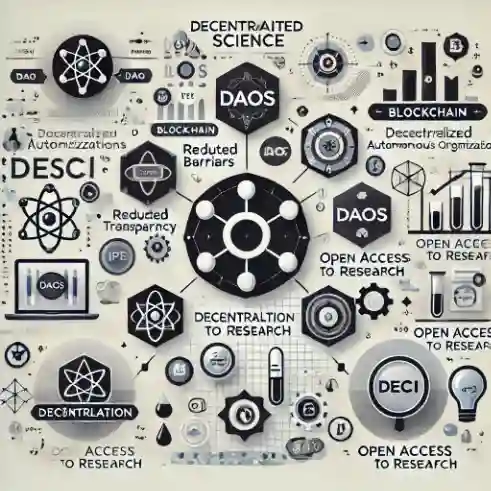
Decentralized Science (DeSci): What It Is and How It Works

What is DeSci?
Decentralized Science (DeSci) is a new approach to scientific research that leverages blockchain technology to create a more open, transparent, and community-driven scientific process. It shifts the traditional, centralized model of research toward a decentralized system, reducing reliance on intermediaries like publishers, universities, and research institutions.
The core principles of DeSci focus on four main ideas: transparency, decentralization, incentives, and collaboration. By decentralizing the research process, DeSci removes many of the traditional barriers, providing broader access to data and reducing the control that central authorities have over the scientific ecosystem.
DeScis goals include increasing public access to scientific data, supporting transparency in peer review, and encouraging collaborative research efforts across the globe. Through blockchain, DeSci guarantees the security and immutability of scientific records, ensuring that all research is verifiable and tamper-proof.
How Does Decentralized Science Work?
At its core, DeSci uses blockchain technology for secure data storage, decentralized autonomous organizations (DAOs) for decision-making, and tokenization to reward contributors and manage intellectual property rights.
Blockchain technology ensures that once data is recorded, it cannot be altered or deleted, preserving the integrity of research.
DAOs facilitate decentralized governance, allowing researchers to manage financial resources and make collective decisions without relying on central institutions.
Tokenization through IP-NFTs (Intellectual Property Non-Fungible Tokens) enables researchers to claim ownership of their research outputs, such as articles, datasets, and patents. These tokens can be used for collaboration incentives, traded, or licensed on decentralized platforms.
By integrating these technologies, DeSci enhances the way scientific research is conducted, incentivizing participation and ensuring fair compensation for contributors.
Key Advantages of DeSci
Reducing Barriers to Entry: DeSci reduces the traditional barriers that prevent researchers, particularly those from underfunded or non-academic backgrounds, from accessing scientific data or contributing to major research projects.
Enhancing Collaboration: DeSci promotes decentralized collaboration by allowing researchers from different disciplines and regions to work together without the limitations of centralized institutions.
Increased Transparency: Blockchain ensures that research is transparent, and every step of the process can be traced. This increases trust and credibility in scientific findings.
Ownership and Control: Through IP-NFTs, researchers have full control over their intellectual property. This allows them to commercialize their work, license it, or share it with others on their terms.
Open Access: DeSci can eliminate paywalls, democratizing access to research and enabling anyone with an internet connection to access scientific knowledge.
Traditional Science vs. Decentralized Science
Collaboration & Innovation
Traditional science often limits collaboration due to institutional silos, whereas DeSci encourages cross-boundary interactions and knowledge sharing using blockchain technology, making collaboration seamless and efficient.
Incentives & Funding
Traditional science often depends on grants and institutional funding, which can create inefficiencies and biases. In contrast, DeSci uses decentralized finance (DeFi) systems to reward researchers based on the quality and impact of their work, ensuring fairer compensation and more flexible funding.
Transparency & Trust
Traditional research processes are heavily reliant on central authorities to validate and approve results. DeSci, however, uses blockchain to ensure that all scientific data is immutable, transparent, and trustworthy, offering a more open approach to validation.
Accessibility
In traditional models, many research papers and data sets are locked behind paywalls, limiting access. DeSci, by utilizing blockchain, creates an open-access system where data is freely available, democratizing knowledge and allowing wider participation in scientific discourse.
Conclusion: The Future of Science with DeSci
DeSci is poised to revolutionize how scientific research is conducted and shared. By decentralizing knowledge creation and distribution, it removes the bottlenecks that traditional science often faces—whether through centralized publishing, funding constraints, or accessibility issues. With blockchain, DAOs, and tokenization, DeSci enables greater collaboration, transparency, and equitable compensation for researchers worldwide.
As the scientific community embraces DeSci, the traditional model of centralized research and publishing will likely be transformed, ushering in a more inclusive, innovative, and open scientific ecosystem.









Comments